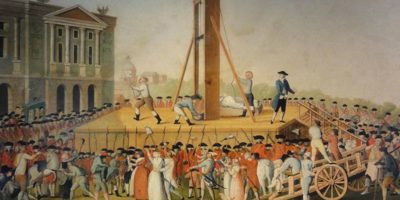
Photo sourced from Wikimedia
Originally published by Lilian on August 2021, Updated by Charity K in April 2023.
Top 15 Facts about Suleiman the Magnificent
He became an emperor of the Ottoman Empire at the age of 26. He was the only son of Selim I and therefore there was no struggle for power. His reign lasted for 46 years, the longest any emperor has ever ruled.
As an emperor to one of the largest kingdoms that lasted for more than 600 years, Suleiman proved he deserved to be on the throne.
He was known by different titles depending on where he went. In the Ottoman Empire, he was referred to as Suleiman I. Suleiman the Magnificent was his title in Europe. The easterners and Turks called him Suleiman the Lawgiver.
During his reign, there was a lot of development in the Empire. He is credited with the civilization of the Ottoman Empire. His great achievements were in the field of law, literature, art, and architecture.
Here are some 10 great facts about Suleiman the Magnificent.
Read more about other similar articles here.
1. Suleiman’s reign is known as the Golden Age
Suleiman the Magnificent supremacy is known as the Golden Age of the Ottoman Empire. He expanded his territory from Vienna to eastern Iran.
The empire was at the center of trade between Asia, Africa, and Europe. As the controlling power of trade in the region, art thrived and grew while the culture diversified.
While all these happened under the watch of Suleiman the Magnificent, he did not do it alone. He got help from his wife and daughter who supervised most of his projects.
Great minds such as artists, writers, intellectuals, philosophers, and craftsmen were drawn to the empire.
His empire brought peace and stability, one that was experienced for the longest time.
2. Suleiman instituted Sharia Law

Photo by Titian – Wikimedia
After he ascended into power, Suleiman the Magnificent had two most important decisions. These two were to free prisoners and compensate merchants.
He freed 1,500 Egyptian and Iranian prisoners. He also compensated merchants for goods that were confiscated by his father.
These earned him the title Suleiman the Lawgiver. Under his leadership, he introduced Sharia law. This was more highly observed in his empire than in any other Muslim state.
Soon after, other Muslim nations practiced the law. There were Sharia courts with lawyers and paralegals.
His subjects were happy and content under Sharia law. These laws ended discrimination against Christians. Lawbreakers were severely punished.
3. Shakespeare wrote about Suleiman the Magnificent
Suleiman I became so popular not only in his Empire but far and beyond. His legacy lived on for decades even after his death.
One of the greatest English playwrights, William Shakespeare, eulogized him in the play The Merchant of Venice.
He acknowledged Suleiman I’s military expertise. America also acknowledged Suleiman I as one of the greatest lawmakers in history.
4. Suleiman the Magnificent built strong fortresses to protect his territory

Photo by Matteo Perez – Wikimedia
One attribute of Suleiman the Magnificent was that he loved great minds. He always was in the company of great minds.
His administrators, chief ministers, poets, architects, and lawyers were experts in their respective fields.
Suleiman commissioned strong fortresses around the land he took from Christians. His cities had mosques, bridges, aqueducts, and other public works. He made the empire a commendable center for a great Turkish and Islamic empire.
Read more about other similar articles here.
5. Suleiman the Magnificent supervised construction he commissioned
One of the greatest architects to live in the Ottoman Empire was Mimar Sinan. He was one of the greatest minds to work under Suleiman the Magnificent. He also worked as a civil engineer for the emperor.
Sinan worked on more than 300 major construction works. Two of his major projects are the Suleiman Mosque in Istanbul. The other one is the Selimiye Mosque in Edirne.
Through his work, he was able to showcase the Ottoman Empire’s culture. Other projects that he worked on include schools, hospices, soup kitchens, markets, and baths.
The two Holy Cities of Islam, Mecca, and Medina, were part of the great projects that Sinan worked on.
6. He broke an Ottoman tradition to marry

Photo sourced from Wikimedia
It was customary for the emperor not to marry. Suleiman was the first emperor to do so. He got married to, Roxelane, his beloved wife.
Suleiman the Magnificent broke the tradition. Roxelane has married a slave. She had several children with Suleiman I. Their sons were sent to rural provinces.
His wife had Russian origin and his marriage to her was monogamous for more than 25 years. Roxelane was powerful and influential in the Ottoman Empire.
As one of the most powerful women in the empire, she influenced the politics in the region. She is considered the pioneer of the Sultanate of Women.
Roxelane was left in charge of the empire when Suleiman the Magnificent was on a military campaign.
7. Suleiman the Great was the first Emperor to travel to Europe
Suleiman the Magnificent had a great appreciation of art. He, therefore, traveled to Europe, a land he had had great art culture.
While there, he got inspired by their architecture, road networks, and postage stamps. He also modernized his military.
8. Suleiman the Magnificent was able to double the size of his empire

Photo by Matteo Perez – Wikimedia
Suleiman I was a highly skilled military strategist. Through the relentless efforts of his military, he was able to double the size of his Ottoman Empire.
He led the army himself and through his commandership, Suleiman conquered Christian strongholds. The empire comprised Belgrade, Hungary, Vienna, and Rhodes.
Suleiman I’s right-hand men included Pargalı Ibrahim Pasha, a prime minister, as well as Hayreddin Barbarossa, an admiral.
Some great leaders that inspired Suleiman included Alexander the Great. He borrowed Alexander the Great military strategy in expanding his military.
Suleiman I led 13 major military expeditions. He spent 10 years of his reign in military campaigns.
9. Education was free in his empire
Suleiman I was greatly loved by his subjects because he was a committed leader.
Part of his great projects in the empire included free, schools, colleges, and universities. The students studied subjects such as languages, philosophy, and astronomy.
Trade in his empire expanded significantly, and the literacy level of his subjects increased. Artistic societies were formed where artists practiced and advanced their skills.
The artists were paid attractive stipends. It was during this Golden Era that great paintings were painted, great books written and magnificent buildings constructed.
10. Only two of his military campaigns failed

Photo by Matrakci Nasuh – Wikimedia
Out of about 13 military campaigns that he led, Suleiman the Magnificent lost two of them.
He won wars in Damascus, Hungary, and Belgrade. When he won the bloody battle in Hungary, he became one of the most feared military leaders in Europe.
Read more about other similar articles here.
11. The Three Major Victories Over Persia
He was wise and always succeeded in his mission, in particular, the three major campaigns against Persia from 1534 to 1535 whereby he gave Ottoman power ver Erzurum. This was the region of Eastern Asia Minor including Iraq. The area surrounding Lake Van was conquered in the second victory in 1548 to 1549 and the third was in 1554 to 1555 in Safavids.
12. His Regime Engaged in talks between the Ottoman and Safavid
In 1555, the first peace talks between a state in Persia known as Safavid. The peace talks bore fruits and show a signing of the peace talk. The talks calmed the fighting although there were no clear guidelines to end the problems encountered.
13. He was a Unique Transformative Leader in Ottoman Empire
In the whole life of the Ottoman Empire, Suleiman the Magnificent was the most powerful, skillful, and one that expanded the Empire more than any other. History records that he transformed the Byzantine city f Constantinople into the current Istanbul. This transformation brought economic growth to the Islamic empire, Turkish in general.
14. He Had a Very Close Relationship with His Wife
Suleiman the Magnificent married a wife called Roxelana. The two exchanged poems that were dedicated to each other during his time away on the battlefield. This showed that they had a very close relationship.
15. His Wife Was Very Influential during his Reign

Follower of Tiziano Vecellio, called Titian, Public domain, via Wikimedia Commons
His wife Roxelana commissioned many projects for the Ottoman Empire. One of the major projects she commissioned was 1539, the Haseki mosque complex in Constantinople. She had a close relationship with the King of Poland, Sigismund II Augustus, and wife and sister to the Shah of Persia on matters of state. She also commissioned a hospital and two schools not forgetting the Islamic bath in Constantinople, Haseki Hürrem Ḥammān in 1556.
Planning a trip to Paris ? Get ready !
These are Amazon’s best-selling travel products that you may need for coming to Paris.
Bookstore
- The best travel book : Rick Steves – Paris 2023 – Learn more here
- Fodor’s Paris 2024 – Learn more here
Travel Gear
- Venture Pal Lightweight Backpack – Learn more here
- Samsonite Winfield 2 28″ Luggage – Learn more here
- Swig Savvy’s Stainless Steel Insulated Water Bottle – Learn more here
Check Amazon’s best-seller list for the most popular travel accessories. We sometimes read this list just to find out what new travel products people are buying.










